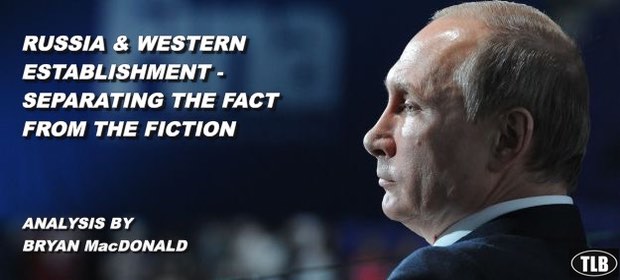
Russophrenia: Western elites ignore their own citizens’ anger and blame Russia instead
BRYAN MacDONALD
At the start of 1917, rumours reached London that something was stirring in Petrograd (now St. Petersburg). As a result, the concerned Prime Minister, David Lloyd George, urgently dispatched Lord Milner, a diplomat of some repute, to the Russian capital.
His Lordship visited the Tsar and spoke to ministers and members of the Duma, who informed him that enemies of the state were spreading groundless yarns. Sadly, being a creature of his class, Milner believed that only the elites mattered, so he neglected to consult any of the general public. Thus, cocooned in his bubble, the peer reported to London that there was nothing the government could not handle and no need to expect no major changes.

© Alexey Druzhinin / Sputnik
However, the same British traveling party also included Lloyd George’s private secretary Philip Kerr. A little more clued in, Kerr walked the streets and interviewed the plain folk. Armed with their predictions, he sent a telegram to Downing Street which asserted that Russia was on the verge of an unstoppable revolution. As it happens, the man who stepped out of the comfort zone was right because Nikolai II was shorn of his crown before the British delegation made it home. We know this story because many years later the ‘Welsh Wizard,’ Lloyd George, revealed the details to Ivan Maisky, the Soviet ambassador to London. And almost a hundred years later, it is a salutary lesson in the dangers of the establishment refusing to acknowledge ordinary people’s concerns when evaluating the causes of political upheaval.
Today, it manifests itself in the electoral earthquakes which have recently shocked America and Britain. Not to mention the increasing popularity of alternative movements across Europe and the diminishing support for traditional centrist parties and their candidates. This has the perennial powers-that-be running scared but, almost uniformly, they seem unwilling to address their own failings.
Heroes and Villains
Instead, they seek bogeymen on which to pin the blame. And Russia has found itself in the cross hairs with alarming frequency. Indeed, it has reached the stage where many popular media outlets see the Kremlin’s hidden hand everywhere. To paraphrase Percy Bysshe Shelley, “Putin’s here, Putin’s there, Putin’s busy everywhere.”
But in reality, he’s not. Because, even if it had the will, Russia simply does not have the resources and capability to interfere in elections across the western world. Sure, Moscow might be able to influence one or two, if it seriously targeted them, but the notion that the Kremlin is playing puppet master in countries as disparate as Bulgaria, Italy, France, Germany and the US is pure hokum.
 Despite this, we have the sad spectacle of some Hillary Clinton supporters trying to explain away her failure in the recent Presidential election on Russian meddling. We have seen them blame Moscow for Wikileaks’ exposure of how her own party rigged its primary to ensure her candidacy. Also, the Kremlin is fingered for leaking damaging information on Clinton’s use of personal email servers, rather than official channels, when Secretary of State. Naturally, the fact that these things actually happened seems to be an aside point.
Despite this, we have the sad spectacle of some Hillary Clinton supporters trying to explain away her failure in the recent Presidential election on Russian meddling. We have seen them blame Moscow for Wikileaks’ exposure of how her own party rigged its primary to ensure her candidacy. Also, the Kremlin is fingered for leaking damaging information on Clinton’s use of personal email servers, rather than official channels, when Secretary of State. Naturally, the fact that these things actually happened seems to be an aside point.
Then there was the almost comedic sideshow of recounts in certain states where Hillary lost relatively narrowly to Donald Trump. Which is Dylan Thomas stuff, raging “against the dying of the light.”
There’s also a schizophrenia at play here, or “Russophrenia” to use a term I coined some time ago. American elites, almost simultaneously, ascribe super powers to Russia and then claim the country is dying. Even those from the same party. Here’s another Democrat, Barack Obama, only two years ago: “Russia does not make anything. Immigrants aren’t rushing to Moscow in search of opportunity… The population is shrinking.”
Reality Bites
Now, never mind that these statements are false; they not only reflect a peculiar type of thinking, but also suggest that the quality of advice US leaders are getting on Russia is extremely poor.* Reading the op-ed pages of outlets like The Washington Post and the New York Times reveals the same. Because in these organs, the most prominent voices on Russia tend to be writers with very little (if any) contemporary practical experience of the country. And they are usually blinded by strong ideology, which means they simply cannot countenance Moscow’s point of view.
In parts of Europe, we have a very strange terminology which divides political parties and candidates into “pro-Russia” and “pro-Europe” camps. And never the twain shall meet. This curious branding ignores domestic concerns in various nations and infantilizes debate. It has also come to mean that any individual who does not unequivocally admonish Moscow is dubbed a “useful idiot”. Thus, Bulgaria’s incoming President Rumen Radev is smeared as “pro-Russian,” despite the fact that he was literally a NATO general until a few months ago.
 This carry on is very dangerous. Because it creates a new dividing line on the continent. Not a physical one as during the Cold War (although NATO is trying hard in that regard) but an artificial equivalent. One where if you oppose US hegemony, hyper-liberalism, the expansion of Brussels’ power across Europe, mass migration and fast-tracked globalization, you are doing Moscow’s bidding. In this unhinged worldview, politicians as different as Jeremy Corbyn, Sigmar Gabriel, Francois Fillon (pictured) and Viktor Orban are branded “pro-Russian.” Which is, frankly, insane.
This carry on is very dangerous. Because it creates a new dividing line on the continent. Not a physical one as during the Cold War (although NATO is trying hard in that regard) but an artificial equivalent. One where if you oppose US hegemony, hyper-liberalism, the expansion of Brussels’ power across Europe, mass migration and fast-tracked globalization, you are doing Moscow’s bidding. In this unhinged worldview, politicians as different as Jeremy Corbyn, Sigmar Gabriel, Francois Fillon (pictured) and Viktor Orban are branded “pro-Russian.” Which is, frankly, insane.
What’s the Story
Then we have the Russian media. There’s also a lot of mental gymnastics taking place when it comes to Moscow-funded broadcasters like RT and Sputnik. On the one hand, we have analysts claiming that the former’s viewing figures are negligible and, on the other, often the same people warn that these entities are a danger to western civilization as we know it. It has now gotten so ridiculous that Westminster and Washington have held committees of inquiry.
What seems to be forgotten is that almost every major country in the world has its own foreign TV channels these days. America boasts RFE/RL and VoA (which have a budget around three times higher than RT), Paris and Berlin bankroll France 24 and Deutsche Welle respectively and Britain’s BBC is a staggeringly large organization which all UK households are obliged to fund via a license fee. In fact, nonpayment can lead to imprisonment.
 Indeed, the current hysteria about RT and Sputnik reminds me of the flak thrown at Al Jazeera during the heady days of the “war on terror”. Back then, the Qatari station was considered sympathetic to Al Qaeda and pro-Wahabi and viewed with suspicion. It is notable that since Doha and the West took the same side on the Libya, Syria and Yemeni conflicts, we almost never hear anybody criticize Al Jazeera anymore. Perhaps the same will be true of RT a few years from now, if Russia and the US find common ground on foreign policy.
Indeed, the current hysteria about RT and Sputnik reminds me of the flak thrown at Al Jazeera during the heady days of the “war on terror”. Back then, the Qatari station was considered sympathetic to Al Qaeda and pro-Wahabi and viewed with suspicion. It is notable that since Doha and the West took the same side on the Libya, Syria and Yemeni conflicts, we almost never hear anybody criticize Al Jazeera anymore. Perhaps the same will be true of RT a few years from now, if Russia and the US find common ground on foreign policy.
One reason for RT’s popularity has been its willingness to promote stories that are largely ignored by the establishment media. For example, UKIP leaders were regulars on the channel at a time when the UK mainstream considered them to be “fringe.” It is now ridiculous how, instead of learning from this mistake, certain prominent figures in Britain would rather pressurize RT and force it off the airwaves. Perhaps they believe that restoring the old status quo in the UK information space will prevent more movements like “Brexit?”
If so, they are making the same mistake Lord Milner made in 1917. Across the West, there are a lot of very upset citizens who are tired of a neoliberal order which has gutted the middle class and condensed wealth and power into large cosmopolitan cities, while ignoring traditional heartlands.
Blaming Russia for this anger is absurd. And it may also have a parallel to the fate of Nikolai II, who considered the Germans to be the greatest threat to his rule, when the real danger was at home. Look how that ended.
*As it happens, Russia makes a lot of things – such as rockets which launch US satellites into space, for instance. It’s also the world’s third most popular migration destination, after the US and Germany and the population has grown in recent years. In addition, Russia has a higher birthrate than most other European countries.
************
ER recommends other articles by RT, and Rethinking Russia where this article originally appeared
About the author
Bryan MacDonald is an Irish journalist based in Russia
 Find out about our great (WOW) TLB Project Membership package and benefits, add your voice and help us to change the world!
Find out about our great (WOW) TLB Project Membership package and benefits, add your voice and help us to change the world!




